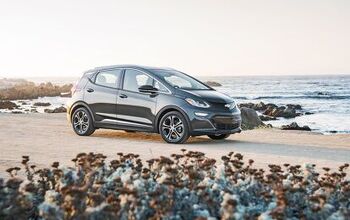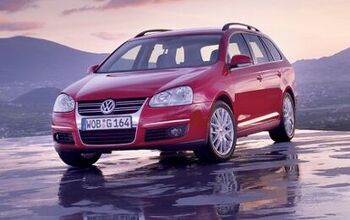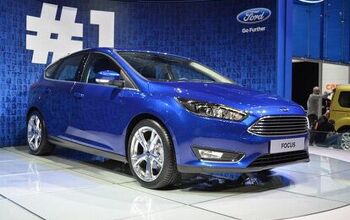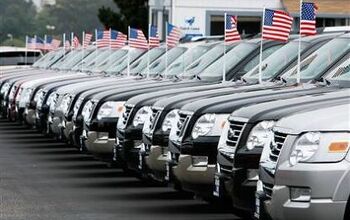Where Are Our Green Car Priorities?
As a relatively pragmatic person who generally chooses the imperfect-yet-achievable path rather than agonizing over the perfect-but-unattainable goal, this chart [from a fascinating Boston Consulting report, in PDF here] frustrates me. I understand why Americans choose hybrid-electric cars as their most favored “green car” technology, but from their it gets fairly crazy. EVs are fantastic on paper, but in the real world they’re still far too expensive, their batteries degrade, they have limited range, oh and did I mention that they’re freaking expensive? Biofuels, America’s third-favorite “green” transportation technology can be fantastic in certain limited applications, but the ongoing ethanol boondoggle proves that it will never be a true “gasoline alternative.” Finally, at the bottom of the list, Americans grudgingly accept only relatively slight interest in the two most promising short-term technologies: diesel and CNG. Neither of these choices is radically more expensive than, say, a hybrid drivetrain and both are considerably less expensive and compromised than EVs at this point. So why are we so dismissive of them?
And here’s how deep the irony goes: America is, apparently, far more sensitive to lifetime costs, and is particularly concerned with upfront costs. So if 56% of Americans are not willing to pay any extra upfront for a “green car,” and only 38% are willing to pay more upfront if it pays off over time, why do 64% claim to be interested in EVs? After all, the battery-powered cars that are currently on the market cost considerably more upfront (on average) than comparable hybrids, diesels and CNG cars. Even the most hard-core EV fans admit that buying an electric car now makes no financial sense, and even hybrids must be driven a huge number of miles to pay off its upfront premium compared to a comparable gasoline or CNG car. American consumers had some of the highest “don’t understand” response rates across the board, but when you break down the data you can’t help wondering if there should have been a few more.
But don’t blame Americans. After all, we’re so well-protected from our energy externalities (a topic I covered recently when I called for a serious push to increase gas taxes), that we couldn’t possibly be expected to know or care about fuel-efficient technologies as our $8/gallon-paying bretheren across the pond and around the world. As this chart shows, the US government lags other developed nations and regions in its fuel economy standard… but even this isn’t the real story. After all, the current argument being made by automakers is that they will be forced to put more cost into future CAFE-compliant cars which consumers will not find worthwhile if gas prices don’t rise. Which brings us back to the real issue:
The problem, it seems, is that America still sees “fuel efficient” cars and “green” cars as being fundamentally different. Just look at the rise of high-priced cars that are green for the sake of being green, and offer no chance paying back their additional costs compared to comparable cars that are simply “fuel efficient.” Fisker’s Karma is “green,” while a 335d is “fuel efficient.” Chevy’s Volt is “green” but the Cruze Eco is merely “efficient.” Tesla’s Roadster is “green” but a Lotus Elise is amazingly efficient. I could go on, but the point should be fairly clear: because “green” has become such an aspirational marketing trope, and because we are still so insulated from the price motivation that drives nearly everyone else on earth to save fuel, we can’t even evaluate the “green car” options out there in a way that makes any sense. In my mind, this is a troubling sign of the market failure that comes from hidden externalities… and as a believer in market solutions, I hope American consumers can start looking at alternative drivetrains with more objectivity in the near future.
More by Edward Niedermeyer
Latest Car Reviews
Read moreLatest Product Reviews
Read moreRecent Comments
- 1995 SC I wish they'd give us a non turbo version of this motor in a more basic package. Inline Sixes in trucks = Good. Turbos that give me gobs of power that I don't need, extra complexity and swill fuel = Bad.What I need is an LV1 (4.3 LT based V6) in a Colorado.
- 1995 SC I wish them the best. Based on the cluster that is Ford Motor Company at the moment and past efforts by others at this I am not optimistic. I wish they would focus on straigtening out the Myriad of issues with their core products first.
- El Kevarino There are already cheap EV's available. They're called "used cars". You can get a lightly used Kia Niro EV, which is a perfectly functional hatchback with lots of features, 230mi of range, and real buttons for around $20k. It won't solve the charging infrastructure problem, but if you can charge at home or work it can get you from A to B with a very low cost per mile.
- Kjhkjlhkjhkljh kljhjkhjklhkjh haaaaaaaaaaahahahahahahahaha
- Kjhkjlhkjhkljh kljhjkhjklhkjh *Why would anyone buy this* when the 2025 RamCharger is right around the corner, *faster* with vastly *better mpg* and stupid amounts of torque using a proven engine layout and motivation drive in use since 1920.

































Comments
Join the conversation
My green car priority is to buy one that won't make my long commute to work unaffordable over the 150,000 or so miles I'm likely to own it. I'll take a chance that 35 mpg highway is good enough to do that. The VW diesels I see along the way throw enough visible smoke after a few years to convince me that they aren't the answer.
When Euro 6 kicks in, you will see "Not Interested" in diesel in Europe go higher. Diesel efficiency will take a big hit in order to pass Euro6 emissions (just like it does now in the USA with Tier 2 BIN 5). Gasoline is the most efficient in terms of costs and emissions and volitility especially with HCCI being developed.